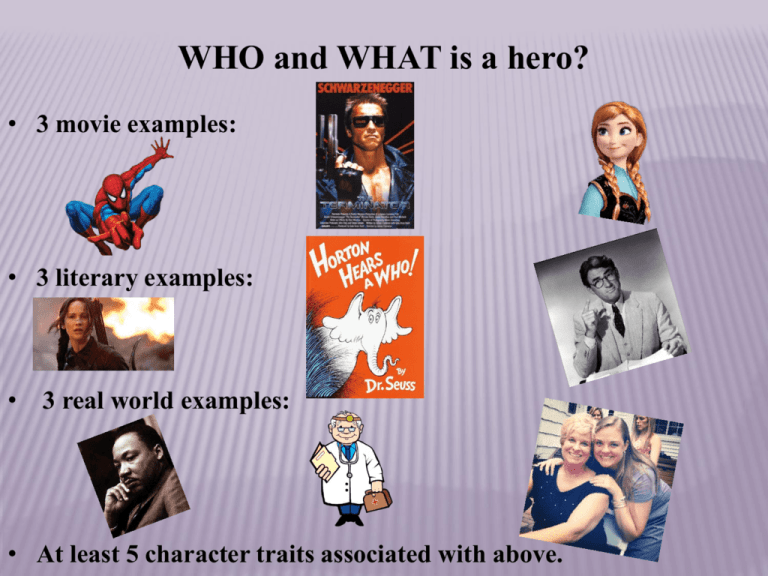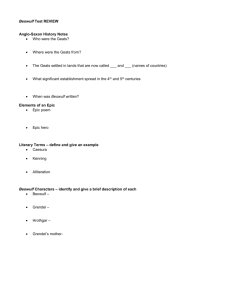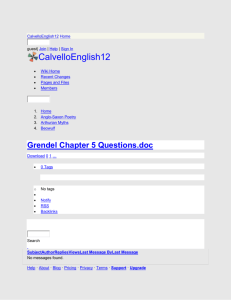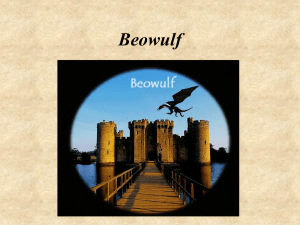Document
advertisement

WHO and WHAT is a hero? • 3 movie examples: • 3 literary examples: • 3 real world examples: • At least 5 character traits associated with above. BEOWULF BACKGROUND INFO AND ANGLO-SAXON PERIOD CONTEXT INFO BACKGROUND INFORMATION: TIME/PLACE 30,000 lines of Anglo-Saxon (old English) poetry survive today 3, 182 (10%) of the lines are from Beowulf Setting of epic– Modern day Denmark (“Danes”) and Sweden (“Geats”) Author - Unknown, probably a monk Composed in the 7th/8th cent. A.D (600-800) Oldest surviving English poem EPIC POEM Long narrative poem that recounts the adventures of a hero. Elevated language Invokes a muse (source of inspiration)** Begins in media res** Hero of well known origin, super strength, vulnerability, rite of passage (birth/death) TITLE OF EPIC POEM Anglo-Saxon word Beo means “bright” or “noble” Anglo-Saxon word wulf means “wolf” Beowulf means bright or noble wolf Other sources say Beo means “bear” THE EPIC HERO Noble Birth “Larger than life” strength (physical and mental) National heroism – reputation at home Great warrior – reputation abroad Goes on a journey – vast settings Human – extreme humility, still flawed Supernatural foes AND help ANGLO-SAXON CULTURE Belief in fate (Wyrd) Accumulated treasures amount to success Fame and fortune zealously sought after Loyalty to one’s leader crucial Importance of pagan, Germanic, and Christian ideals to people whose lives were often hard and uncertain ANGLO-SAXON CULTURE Fierce, hardy life of warrior and seamen Strength, courage, leadership abilities appreciated Boisterous yet elaborately ritualized customs of the mead-hall Expected the hero to boast ANGLO-SAXON IDEALS CODES OF CONDUCT Good defeats evil Wergild--restitution for murder or expect revenge from victim’s relatives Boasts must be backed with actions. Fate is in control Fair fights are the only honorable fights ELEMENTS OF ANGLO-SAXON POETRY Chant-like effect of the four-beat line Alliteration Caesura-pause or break in a line of poetry(“Oft to the wanderer - weary of exile”) Enjambment-one line of poetry continues on to the next, without pause Kenning-metaphorical phrase used instead of a name (“whale-road”, “battle-dew”, “ring giver”; more modern examples “gas-guzzler” or “headhunter”) Hyperbole-exaggeration Setting: Beowulf’s time and place Europe today Insert: Time of Beowulf Some terms you’ll want to know scop A bard or story-teller. The scop was responsible for praising deeds of past heroes, for recording history, and for providing entertainment Wergild: “man payment” for respect Terms: Thane and Mead-Hall thane A warrior mead-hall The large hall where the lord and his warriors slept, ate, held ceremonies, partied, etc. MAIN CHARACTERS BEOWULF Epic hero Geat (from southern Sweden) Nephew of Higlac (King of Geats at story’s start) Sails to Denmark to help Hrothgar HROTHGAR Danish king Builds Herot (mead hall) for men Tormented by Grendel for 12 years Loses many men to Grendel Joyless before Beowulf’s arrival GRENDEL Referred to as demon and fiend Descendant of Cain Lives below the sea in a cave with mother Attacks and kills Hrothgar’s men night after night in the mead hall GRENDEL’S MOTHER Referred to as “shewolf” Lives under a lake Challenges Beowulf FIRE DRAGON Lives in a cave in Beowulf’s kingdom Woken up when a slave stole a gem studded cup Guards countless treasures Who and what are monsters? Monsters from movies: • What are other words associated with the term “monster”? Monsters from literature: Real life “monsters”: • What do monsters symbolize? • In what ways are monsters beneficial or necessary to the world? GRENDEL ANALYSIS What are words/phrases associated with Grendel? (5 textual examples) What does Grendel symbolize to the Danes? Explain. What does Grendel symbolize to Beowulf? Explain. What do Grendel’s actions reveal about him? What is something positive that comes from Grendel’s presence?






